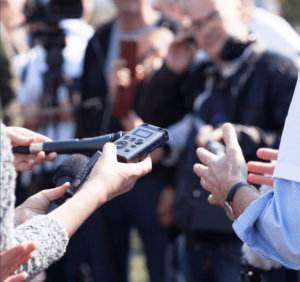 Congratulations! Your start-up company’s ready to announce its first product. Or maybe you’re handling a competitive announcement from one division of a huge corporation. Or maybe you’re somewhere between big business and entrepreneurship. Whatever the size of your organization, you’ve moved into the public relations stage. Let’s assume everything is ready: press list, press release, booth reserved at key trade shows. You’re good to go, right? Wrong. Because unless you and your staff are prepared for the series of media interviews that are (hopefully) about to ensue, you could be setting yourself up for disaster.
Congratulations! Your start-up company’s ready to announce its first product. Or maybe you’re handling a competitive announcement from one division of a huge corporation. Or maybe you’re somewhere between big business and entrepreneurship. Whatever the size of your organization, you’ve moved into the public relations stage. Let’s assume everything is ready: press list, press release, booth reserved at key trade shows. You’re good to go, right? Wrong. Because unless you and your staff are prepared for the series of media interviews that are (hopefully) about to ensue, you could be setting yourself up for disaster.
Successful journalists are always after exclusive news. At the very least, they want to publish it first. They’re always on the lookout for the scoop, and seasoned journalists have a number of ways to get you to say things you shouldn’t, or to not say things that you should. These can include being likable, counting on your natural tendency to boast, carefully worded phrases that you agree with too quickly, and speaking with you and your staff in informal situations. (This is not a condemnation. It’s their job, and ethical journalists deserve your respect.)
So how do you become prepared for your first media interview? Public relations, especially when dealing with the press, is both an art and a science. We’ll start with the latter, because it consists of well-defined rules and steps that anyone can follow.
1. United We Stand. A well-defined set of key messages must be defined and memorized, with the complete understanding that these are the only legitimate responses to questions, from the press or otherwise. This controls the content of the information released.
2. Promises, Promises. If your announcement is sensitive, you can ask journalists to sign a non-disclosure agreement prior to any media interview, which stipulates that any information given to the journalist cannot be released until the agreed-upon date. This controls the timing of the information released.
3. Who’s On First? It’s your show. You, not the journalist, must run any media interview. That’s something easier said than done. Remember that you’re under no obligation to answer any question that you deem unsuitable or are simply unwilling to answer. This controls the structure of the information released.
4. Who’s Got Your Back? If the task of maintaining this degree of control — and ensuring total staff compliance — seems too daunting, bring a public relations professional into the loop to be your point-of-contact for press inquiries. This controls the messaging of the information released.
The art of running a successful media interview can be a bit vague. It typically comes from having experience with the press, as well as the result of having established good relationships with specific journalists. Since first-timers are, by definition, outside of this circle, you can rely on other sources.
1. Training. Bring in a public relations consultant to educate the company’s spokespersons in press relations, while mandating that only the individuals who have been trained speak to the press.
2. Role-Playing. Take training a step further by actually conducting mock interviews with public relations consultants who have journalism experience.
3. Public Relations Professionals. Consider handing over all press responsibilities — not just fielding inquiries, as suggested above, but running all media interviews — to a public relations professional. He/she will be ready to take over if things get dicey.
4. Presence of Mind. The company’s key spokesperson should always be “on.” Casual meetings, cocktail parties, and other informal occasions require a heightened awareness to maintain secure control of the information you reveal.
This article, written by Stuart M. Dambrot, originally appeared in PR Fuel (https://www.ereleases.com/prfuel), a free weekly newsletter from eReleases (https://www.ereleases.com), the online leader in affordable press release distribution. To subscribe to PR Fuel, visit: https://www.ereleases.com/prfuel/subscribe/.
